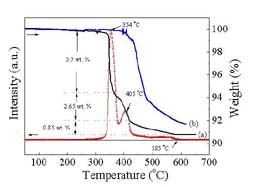
Magnesium destabilized the LiBH4 resulting in complete dehydrogenation of the borohydride phase and the formation of a Li-Mg alloy, prior to the appearance of MgB2.a) TG and MS results for the evolution of H2 from LiBH4/MgH2 milled for 1 h. b) TG results for LiBH4. Both experiments used a heating rate of 10 ˚C min-1.
A new dehydrogenation mechanism for LiBH4, a new hydrogen storage material, has recently been developed by CAS scientists and scholars from the University of Nottingham (UoN), showing a promising future for its onboard applications.
With very high hydrogen storage capacities, LiBH4 is widely recognized as an ideal fuel carrier for future vehicles and has become a hot issue in the materials science since years ago. However, the reaction conditions of its dehydrogenation and rehydrogenation, the superior temperature and pressure needed for instance, have long been a headache for scientists.
Dr. YU Xuebin from the Laboratory of Energy Science & Technology, Shanghai Institute of Microsystem and Information Technology (SIMIT) under CAS and Dr. Garvin S. WALKER from UoN Advanced Materials Research Group have made joint efforts with their colleagues in this regard to seek new catalysts which can help improve the kinetics of the reactions and help reduce the stern conditions required for rehydrogenation.
In their experiment, a mixture of LiBH4 and MgH2 was investigated on its hydrogen storage capacities. The result showed that magnesium destablished LiBH4, namely a complete dehydrogenation of the borohydride phase while the dehydrogenation and rehydrogenation temperatures of the mixture prominently lowered. The formation of Li-Mg alloys were discovered for the first time, which indicated the significance of Mg as an effective catalyst.
The research outcome has already been published in the latest volume of
Chemical Communications (2006, DOI: 10.1039/b607869a).
As early as in May this year, the two sides of the research team inked an agreement for carrying out substantial and effective research cooperations on the basis of mutual benefit.







